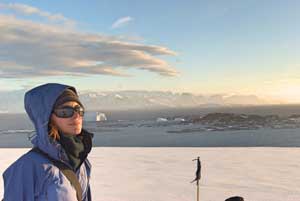 KINGSTON, R.I. – August 12, 2015 – Abigail Bockus took a rather atypical route to becoming a marine biologist. A native of Manhattan, Kansas, she studied neurobiology at the University of Kansas and worked in biomedical research after graduation, examining why the combination of alcohol and aspirin leads to liver damage.
KINGSTON, R.I. – August 12, 2015 – Abigail Bockus took a rather atypical route to becoming a marine biologist. A native of Manhattan, Kansas, she studied neurobiology at the University of Kansas and worked in biomedical research after graduation, examining why the combination of alcohol and aspirin leads to liver damage.
But in the back of her mind she was being drawn to marine science, a discipline she hadn’t studied but had learned about on family trips to visit relatives in California. So she took the plunge and enrolled to earn a doctorate in marine biology at the University of Rhode Island, and now she is up to her elbows in sharks and krill and fish and more. And she’s loving it.
In the last four years, Bockus has spent five months in Antarctica studying how krill will fare as the Southern Ocean warms, another two months on research ships in the Sea of Cortez, Hawaii and elsewhere, and many more months in a laboratory at URI examining how a tiny molecule helps marine life handle the stresses of warming waters, extreme pressure and other factors.
It is the molecular work that links her early interest in neurobiology and her present studies of marine life.
“I always knew my biomedical career was temporary,” said Bockus. “I was mostly there to get some lab experience. I really wanted to bring my strengths in molecular biology and apply that to something I was really interested in – marine science.”
She chose URI for her doctorate based entirely on the research of Professor Brad Seibel, who studies how marine life adapts to extreme environments, from the deep-sea to the polar regions.
Describing herself as an eco-physiologist for her studies of how marine organisms are adapted to their habitat, Bockus focuses on a tiny molecule called trimethylamine oxide or TMAO, which is found inside the cells of most living things and serves to protect proteins from stress.
“TMAO helps cells work the way they’re supposed to work, and it’s good at combating stress,” she explained. “If an animal is under stress, TMAO can help prevent damage to the cell.”
For her dissertation, she is studying how TMAO works to help marine life survive in various stressful circumstances. For instance, she examined how deep-sea fish in the waters around Hawaii accumulate TMAO to fight the effects of extreme pressure. She found that fish species that live in deep water, like anglerfish, accumulate much more TMAO than those living in shallow water.
She is also studying how sharks that migrate from Maine to North Carolina accumulate TMAO – do they produce it in their tissues or does it come from their diet? – and whether it is used to combat temperature stress.
“If they have a lot of ways they can handle temperature stress, then maybe the warming waters won’t be a problem for them,” Bockus said. “But if they are susceptible to temperature stress, then their behavior may change quite a bit and they may have to alter their migrations.”
To study how krill use TMAO to combat temperature stress in the Southern Ocean, she traveled twice to Antarctica to conduct studies of how warming waters and increasing acidification affect krill growth and physiology. Bockus received funding from the Rhode Island Experimental Program to Stimulate Competitive Research for her Antarctic research.
“We were at Palmer Research Station located right on the water, with a glacier behind us where we could snowshoe or ski, with whales coming up in the bay around the station, and lots of local islands with penguin colonies,” she said. “The wildlife was incredible!”
With less than a year left before she completes her doctorate, Bockus is beginning to look toward her next chapter. And she is considering another slight shift in direction.
“I would really like to direct my knowledge toward applied aquaculture, something that has direct applications to leading issues of the day – sustainability and global development,” she said. “Aquaculture is a little out of my current realm, but I’m drawn to the research because it has a great deal of potential for creating change.”
Pictured above: URI doctoral student Abigail Bockus poses in Antarctica during her trip to study krill.
(Photo submitted by Abigail Bockus.)

